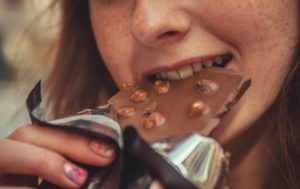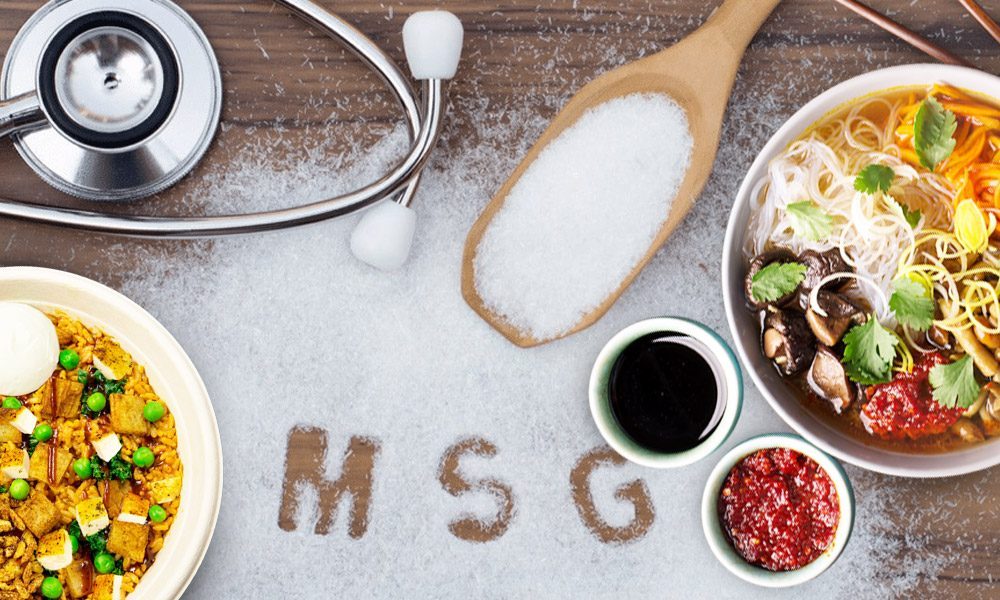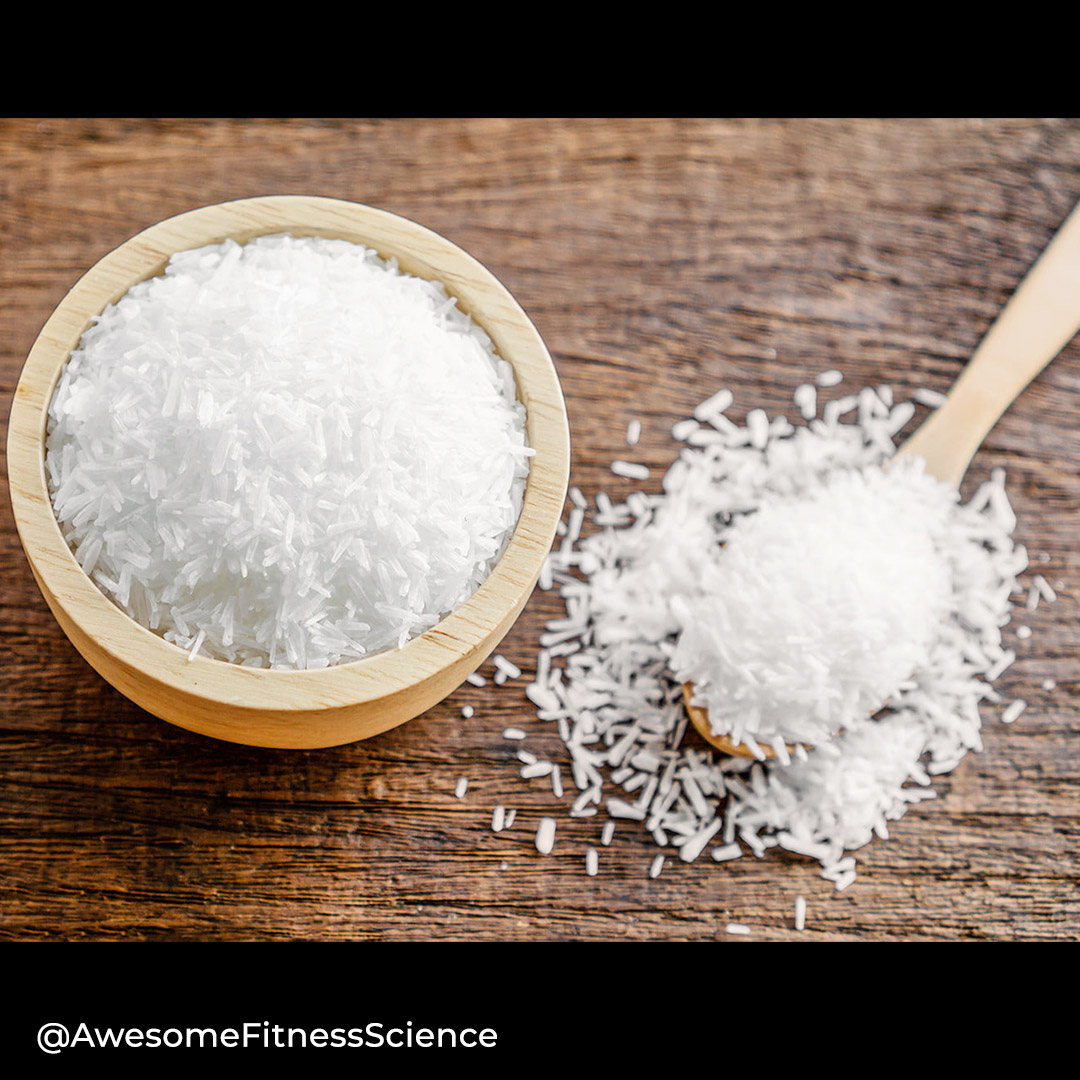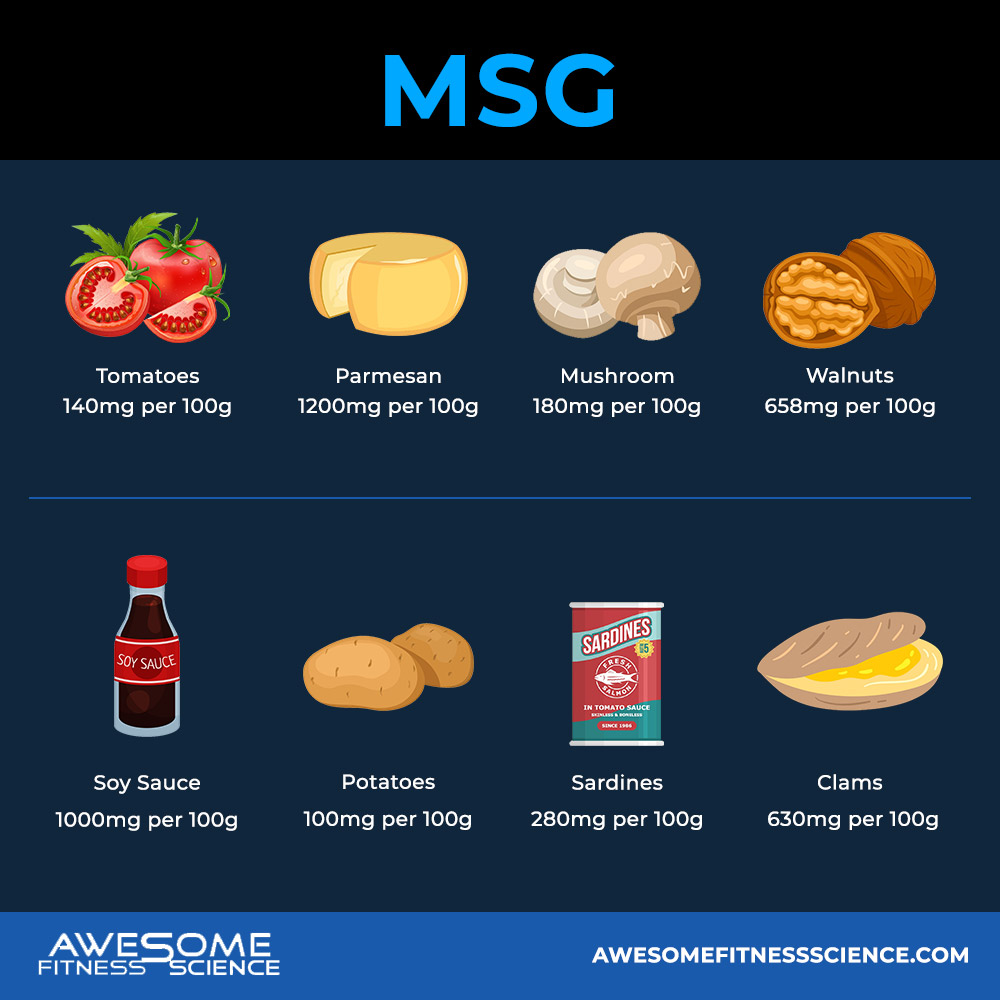
How to Finally Reign Over Any Sabotaging Food Craving
Let’s talk about those food cravings that sabotage your weight loss efforts. By definition, a craving is an intense desire to consume a particular type of food that is hard to resist.

MSG is often criticized for numerous health detriments. Some claims include headaches, sweating, heart palpations, burning sensations, nausea, brain toxicity, asthma, liver damage, and the death of all your pets. Ok, that last one was an exaggeration, but the point I’m getting at is that the media treats MSG like poison.
People will blindly regurgitate these rumors about MSG. As you’ll see though, you’ve been lied to about MSG.
MSG is the taste of umami. Some call it powdered umami.
Umami is a savory like flavor distinct from the other 4 common tastes (sweet, sour, salty, bitter). In fact, umami has it’s own taste receptors (1). Umami was proposed as it’s own taste in 1908 and is the taste of glutamates. It’s common in Asian cuisines, although many cultures have strongly adopted umami flavors as well thanks to it’s delightful taste.
Unfortunately, stuff that taste good is usually associated with being bad for you. This is awful logic because it’s not always true. But first, a history lesson on how MSG got such a bad reputation.
MSG was discovered in Japan and was originally marketed in Asian countries towards upper class housewives (2). It made its way to China after being marketed as a flavor enhancer for vegetarian food which catered towards Buddhist groups.
By the mid 1930s, Ajinomoto which is the household brand of MSG, made it’s way to America. Asian American discrimination was quite prominent during this time especially after the bombing of Pearl Harbor in 1941.

Many artificial additives had been banned during this time as well, so MSG and anything Asian related weren’t necessarily celebrated.
Fast forward to 1968, some jerk-face who probably has no life submitted a letter to the New England Journal of Medicine about how Chinese food causes numerous nasty syndromes (3). He suspected it was either salt, MSG, or cooking wine despite all of these ingredients being used in other cuisines as well.
Nonetheless, the paper was published and blamed MSG as the primary culprit. The term “Chinese Restaurant Syndrome” made the scientific journal’s headlines among many of news headlines. This spread like wildfire despite no objective evidence for it.
Later, a 1986 journal article was published defending MSG and contested “Chinese Restaurant Syndrome” had no tangible evidence (4). However, the damage was already done. The propaganda was baked into brains. Many Chinese restaurants had to concede to the MSG myths to avoid conflict and keep their businesses running.
Over the course of decades, that term was still used, MSG continued to be vilified, and a new term was born (5), “The Won-ton Soup Headache.” In fact, if you look back at the history of Chinese food during this time, Chinese food and Chinese people were viewed as dirty, dangerous, and primitive (5).
Some of the racial controversy is much better today, but in recent decades, MSG continues to be vilified and many people still use the term “Chinese food syndrome.”
It’s a shame ignorance still exists. I remember growing up, eating MSG in many things. As I got older, I noticed my family stopped cooking with it because mom saw some bs headline that MSG slaughters your health. Many Asian restaurants now abstain from cooking with MSG and put up “No MSG” signs either because they don’t know any better or to cater to people’s misconceptions.
Nevertheless, there’s a reason those restaurants don’t taste as good.
MSG is quite magical. If you’ve never used it in your cooking, you’re missing out on an easy way to make many dishes tastier. But just because it tastes good, does not mean it’s bad for you.
I mean, many Asian cultures have high MSG consumption yet live far past Western lives where we’re scared of MSG, but get wasted every weekend. However, I digress. Let’s transition from the history to the science of MSG.
MSG’s chemical name is monosodium glutamate. It’s simply salt and glutamate which is an amino acid found in many foods to give it that umami flavor.
Glutamate is found in tons of everyday food (image below). In fact, you eat more 20-40x more glutamate from naturally occurring foods than the average MSG consuming person does in added MSG.
Furthermore, the body and the brain processes naturally occurring MSG the same way as added artificial MSG (8,11).

So what happens when you take a bunch of self-proclaimed MSG sensitive dorks and feed them MSG without them knowing? Nothing. There’s no difference between them and placebo with doses as high as 12 grams per day (6,7).
So even with extreme doses beyond any reasonable human consumption, there are no side effects.
In fact, we’ve had published safety updates and endless research on MSG in the last 3 decades showing that it’s are perfectly safe across all ages and none of the nasty claims made against MSG are true (9-14).
Oh, but here’s the science nobody talks about. MSG is not only safe, but it provides a host of juicy benefits thanks to glutamate.
Furthermore, people who exercise have a stronger preference towards the umami flavor (21). This is why fit people are more likely to like Asian food.
We live in a world filled with ignorant clowns who still talks smack about MSG. The bottom line is that MSG is safe and can even be beneficial. If you know anyone who still thinks poorly of MSG, certainly send them this article.
1. Torii, Kunio, et al. “Physiological Roles of Dietary Glutamate Signaling via Gut-Brain Axis Due to Efficient Digestion and Absorption.” Journal of Gastroenterology, Springer Japan, Apr. 2013, https://www.ncbi.nlm.nih.gov/pmc/articles/PMC3698427/.
2. Sand, Jordan. “A Short History of MSG: Good Science, Bad Science, and Taste Cultures.” University of California Press, Oxford University Press, 1 Nov. 2005, https://online.ucpress.edu/gastronomica/article-abstract/5/4/38/47046/A-Short-History-of-MSG-Good-Science-Bad-Science?redirectedFrom=fulltext.
3. JH;, Schaumburg HH;Byck R;Gerstl R;Mashman. “Monosodium L-Glutamate: Its Pharmacology and Role in the Chinese Restaurant Syndrome.” Science (New York, N.Y.), U.S. National Library of Medicine, https://pubmed.ncbi.nlm.nih.gov/5764480/.
4. RA;, Kenney. “The Chinese Restaurant Syndrome: An Anecdote Revisited.” Food and Chemical Toxicology : an International Journal Published for the British Industrial Biological Research Association, U.S. National Library of Medicine, https://pubmed.ncbi.nlm.nih.gov/3525357/.
5. Mosby, Ian. “’That Won-Ton Soup Headache’: The Chinese Restaurant Syndrome, MSG and the Making of American Food, 1968–1980.” OUP Academic, Oxford University Press, 2 Feb. 2009, https://academic.oup.com/shm/article-abstract/22/1/133/1627040.
6. Tarasoff, L., and M.F. Kelly. “Monosodium L-Glutamate: A Double-Blind Study and Review.” Food and Chemical Toxicology, Pergamon, 8 Nov. 2002, https://www.sciencedirect.com/science/article/abs/pii/027869159390012N.
7. Rosenblum, Ira, et al. “Single and Double Blind Studies with Oral Monosodium Glutamate in Man.” Toxicology and Applied Pharmacology, Academic Press, 27 Sept. 2004, https://www.sciencedirect.com/science/article/abs/pii/0041008X71901293.
8. JD;, Fernstrom. “Monosodium Glutamate in the Diet Does Not Raise Brain Glutamate Concentrations or Disrupt Brain Functions.” Annals of Nutrition & Metabolism, U.S. National Library of Medicine, https://pubmed.ncbi.nlm.nih.gov/30508818/.
9. Walker, Ronald, and John R. Lupien. “Safety Evaluation of Monosodium Glutamate.” OUP Academic, Oxford University Press, 1 Apr. 2000, https://academic.oup.com/jn/article/130/4/1049S/4686675#111848867.
10. KM;, Williams. “Monosodium Glutamate ‘Allergy’: Menace or Myth?” Clinical and Experimental Allergy : Journal of the British Society for Allergy and Clinical Immunology, U.S. National Library of Medicine, https://pubmed.ncbi.nlm.nih.gov/19389112/.
11. HN;, Henry-Unaeze. “Update on Food Safety of Monosodium L-Glutamate (MSG).” Pathophysiology : the Official Journal of the International Society for Pathophysiology, U.S. National Library of Medicine, https://pubmed.ncbi.nlm.nih.gov/28943112/.
12. M;, Freeman. “Reconsidering the Effects of Monosodium Glutamate: A Literature Review.” Journal of the American Academy of Nurse Practitioners, U.S. National Library of Medicine, https://pubmed.ncbi.nlm.nih.gov/16999713/.
13. Y;, Obayashi. “Does Monosodium Glutamate Really Cause Headache? : A Systematic Review of Human Studies.” The Journal of Headache and Pain, U.S. National Library of Medicine, https://pubmed.ncbi.nlm.nih.gov/27189588/.
14. Zanfirescu. “A Review of the Alleged Health Hazards of Monosodium Glutamate.” Comprehensive Reviews in Food Science and Food Safety, U.S. National Library of Medicine, https://pubmed.ncbi.nlm.nih.gov/31920467/.
15. E;, Miyaki. “Monosodium L-Glutamate in Soup Reduces Subsequent Energy Intake from High-Fat Savoury Food in Overweight and Obese Women.” The British Journal of Nutrition, U.S. National Library of Medicine, https://pubmed.ncbi.nlm.nih.gov/26455957/.
16. E;, Imada. “Supplementing Chicken Broth with Monosodium Glutamate Reduces Energy Intake from High Fat and Sweet Snacks in Middle-Aged Healthy Women.” Appetite, U.S. National Library of Medicine, https://pubmed.ncbi.nlm.nih.gov/24768895/.
17. A;, Carter. “Supplementing Chicken Broth with Monosodium Glutamate Reduces Hunger and Desire to Snack but Does Not Affect Energy Intake in Women.” The British Journal of Nutrition, U.S. National Library of Medicine, https://pubmed.ncbi.nlm.nih.gov/21736801/.
18. Masic, Una, and Martin R Yeomans. “Monosodium Glutamate Delivered in a Protein-Rich Soup Improves Subsequent Energy Compensation.” Journal of Nutritional Science, Cambridge University Press, 13 Aug. 2014, https://www.ncbi.nlm.nih.gov/pmc/articles/PMC4153311/.
19. JX;, Halim. “The Salt Flip: Sensory Mitigation of Salt (and Sodium) Reduction with Monosodium Glutamate (MSG) in ‘Better-for-You’ Foods.” Journal of Food Science, U.S. National Library of Medicine, https://pubmed.ncbi.nlm.nih.gov/32776553/.
20. Magerowski, Greta, et al. “Neurocognitive Effects of Umami: Association with Eating Behavior and Food Choice.” Neuropsychopharmacology : Official Publication of the American College of Neuropsychopharmacology, Springer International Publishing, Sept. 2018, https://www.ncbi.nlm.nih.gov/pmc/articles/PMC6098010/.
21. Feeney, Emma L, et al. “Sweet and Umami Taste Perception Differs with Habitual Exercise in Males.” Nutrients, MDPI, 12 Jan. 2019, https://www.ncbi.nlm.nih.gov/pmc/articles/PMC6357145/.
Grab my free checklist on how to defeat your worst food cravings

Let’s talk about those food cravings that sabotage your weight loss efforts. By definition, a craving is an intense desire to consume a particular type of food that is hard to resist.
Tracking macros is the most lifechanging skill for your long-term health, fitness, and food flexibility

One of the points of partial reps is that you can use higher loads given the same effort and volume. Could there be any benefit in doing this? Could sacrificing range of motion produce better results? Or is it just a way to stroke your ego?